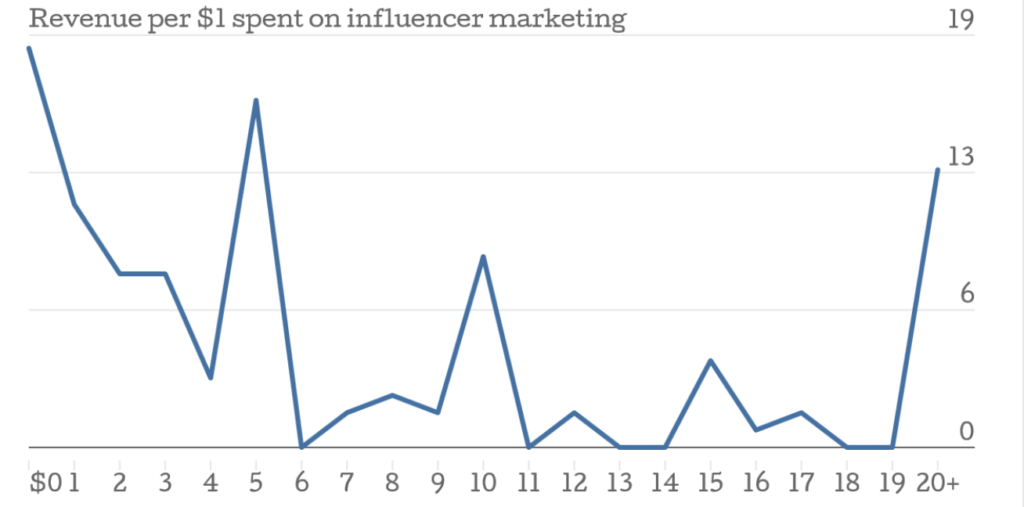Table of Contents
For your startup company to grow and succeed in a heavily saturated market, it’s important to invest time and effort in your marketing strategies. Generally, startups have limited funds and resources and finding the most cost-effective way to showcase your brand is difficult. A great solution to this is influencer marketing for startups.
What is influencer marketing? Read about it here!
Influencer marketing campaigns have the ability to reach a company’s target audience with the help of social media influencers who are responsible for sending the brand’s message while promoting their products or services. These campaigns create buzz for your brand, and for startups, this is an essential piece of the puzzle in getting the attention of potential investors. The more eyes on your company, the more funding opportunities there are available to you. This marketing strategy is best-fit for startups because it maximizes their engagement and brand awareness, all while costing the company very minimal. The best way to minimize the cost of influencer marketing is by working with micro-influencers.
Why Micro-Influencers?
Obviously working with influencers who have millions of followers is not ideal for startups in terms of cost, but there are many other small-scale influencers who get the job done. Although micro-influencers are less expensive to partner with and have a smaller following, they usually have higher engagement rates and a much more niche audience. A study found that micro-influencers on Instagram have an average engagement rate of 3.86%, which is more than double the rate of mega-influencers at 1.21%. This can be very beneficial for startups that want to target a specific group of people in terms of their interests and how willing they are to interact with the influencer.
Ready to start working with micro influencers? Read all the ups and downs of micro influencer marketing here.
Benefits of Influencer Marketing for Startups
In order to fundraise from investors, it is critical for startups to show their product-market fit through influencer marketing. There are many ways in which influencer marketing can achieve this while also generating sales for the company.
1. Brand Awareness
Influencer marketing campaigns for startups generally have brand awareness as their overarching goal on their sales journey. This is because if you’re successful in generating awareness for your brand, sales and audience size will simultaneously grow, and trust from consumers will follow. All of these factors are necessary for startup businesses to possess in order to maximize sales.
How brand awareness is achieved through influencer marketing is by influencers with a loyal following advertising your brand through display pictures, informational videos, or even by hosting a giveaway on their account. Establishing a strong brand presence is particularly crucial for creating a successful startup MVP. Why is brand awareness beneficial to startup companies in terms of sales? Here are a few reasons:
- Increases in website traffic
- Gets the attention of investors
- Distinguishes your brand from competitors
- Makes consumers want to buy your products
Looking to run an epic influencer marketing campaign for your startup? NeoReach has the best experience in creating viral campaigns that convert on social media. Sign up here!
2. A Better ROI
Almost all startup businesses set a strategic marketing budget that must be followed due to limited funds in the beginning. Investing in quality and beneficial advertisement doesn’t have to be expensive, though. Digital advertising in particular has the power to produce an amazing ROI for startups. Based on an influencer marketing study, businesses generate $6.50 in revenue for each $1 invested in influencer marketing. Even a small investment in digital marketing can grow sales astronomically.
Via Tomoson
3. Quevos Chips
Quevos was founded by Zack, a Type 1 Diabetic who couldn’t enjoy a bag of chips without having to give himself an insulin shot as a result of the high level of carbohydrates they contained. Zack took it upon himself to create a low-carb, flavorful chip that had the nutrition equivalent to an egg white omelette. After two years of hard work, Quevos chips were born.
Influencer marketing for startups is an amazing way to generate brand awareness, grow sales, and get people to start talking about your company. With the help of NeoReach and partner marketing agency, Influence Hunter, a social media campaign was created for Quevos chips. As a startup company looking to promote its brand, Quevos partnered with various micro-influencers who created content related to health and food.
To promote the brand, influencers posted pictures of product displays, gave their followers discount codes for the chips, and even hosted giveaways. Although the influencers they partnered with shared the same category of content, they were diverse in that some were athletes, some were dietitians, and some were simply sharing their keto diet journey on Instagram. The campaign took place across many social media platforms including Instagram, YouTube, and TikTok. This level of variety helped Quevos reach different audiences and maximize their engagement with potential consumers.
View this post on Instagram
Overall, the campaign was a huge success. Based on the campaign performance that Influence Hunter was able to track, it was estimated that there were 20,000 visits to the website, a total revenue of $25,000, and an increase in ROI by 550%. This success was achieved by a monthly budget of $1,500 (a 3 month spending equaling 4,500). This campaign is a great example to show that influencer marketing for startups can be achieved through low costs and the right means of budgeting, which can lead you to get funding in order to thrive in the marketplace.
Want to see more of their success? Read the full breakdown on Quevos’s campaign and profit here.
4. Banza Pasta
Although the market is flooded with various healthy substitutes for traditional pasta, Banza was the first to introduce a chickpea-based alternative. In 2014, brothers Brian and Scott Rudolph founded the startup with the goal of giving consumers the first ever pasta with nearly twice the protein, three times the fiber, and 30% fewer net carbs than traditional pasta. The company struck major success early on when they appeared on the reality show “Restaurant Startup” where they were able to convince judges to invest in their company. To keep the momentum going and create long-term growth for their company, Banza turned to social media in hopes to get more eyes on their product.
Banza’s marketing strategy was to utilize social media influencers with interests in health, food, and fitness to vouch for their brand. To kick off the campaign, Brian personally reached out to influencers asking if they would want to try his product. From there, some influencers posted unique recipes incorporating the product and showing them off in an aesthetic way. Other influencers taught their audience how pasta can be incorporated into healthy diets while still meeting their fitness goals. Food critics also gave their honest opinions on the pasta.
View this post on Instagram
Overall, the campaign was a huge success – the brand received an overwhelming amount of positive responses from consumers and many became invested and loyal to the brand. As of 2018, Banza said they received around 30,000 pieces of user-generated content, and 80% of it came from first-time customers. With a steady stream of new eyes on their pasta, the company was eventually able to expand its product line which now includes pizza, mac and cheese, and rice.
























